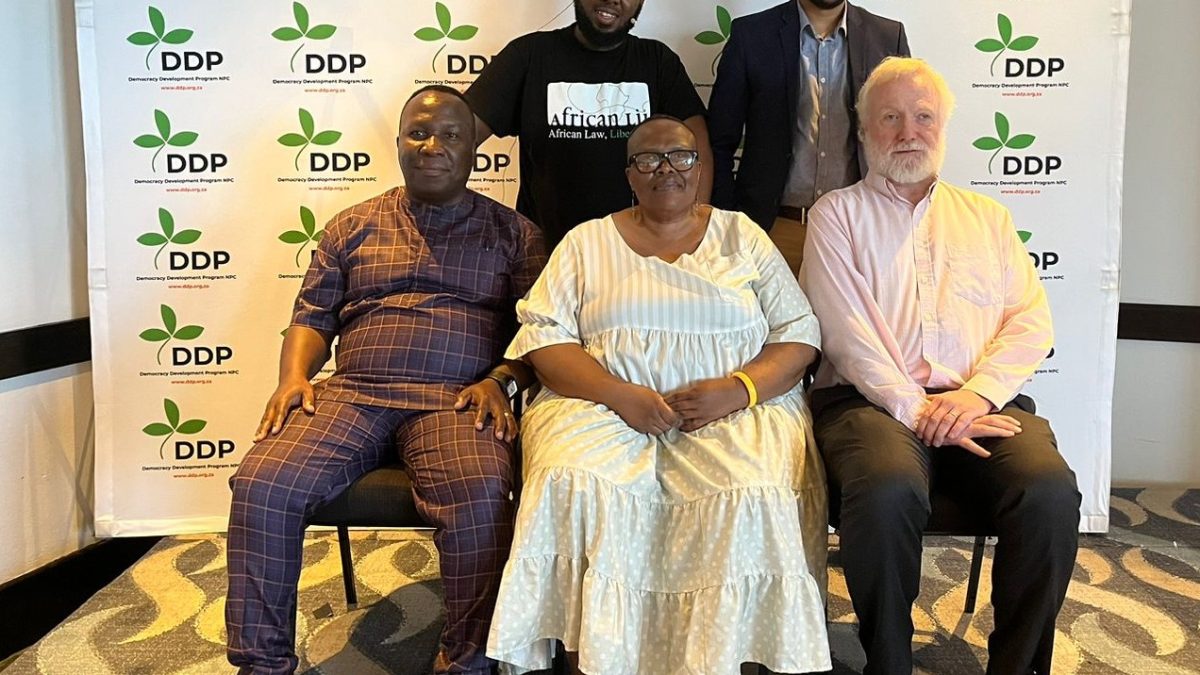Unpacking Democracy Public Forum – 20 April

On 20 April 2023, DDP hosted the Unpacking Democracy in South Africa public forum. The event was convened to provide space for those in the civic, government, and market space to talk about the status of democracy in South Africa today.
Speakers for the event included Oliver Dickson, SAFM radio presenter; Preston Govindasamy, survey manager at Afrobarometer and; Zandile Nsibande, an activist at Abahlali baseMjondolo. The event produced quantitative and qualitative discussions surrounding South Africa’s democratic status.
With nearly 30 years into democracy, South Africa continues to face socio-economic challenges linked with poverty, inequality, and unemployment. The key question asked at the event is how democracy as a political system or governance system impacted poverty and intergenerational inequality in the country. South Africa like any other country in Africa was under colonization through the apartheid regime that governed the country until it gained independence in 1994. The art of ccolonizationwas almost similar across the world in that it was premised n grabbing conomic assets nd opportunities rom the oppressed. That means colonialism was an art of looting, deprivation, and dehumanization.
Although South Africa is one of the last if not the last country in the Southern African Development Community (SADC) to gain independence, it has been hailed as one of the countries in the region for running the best democracy. President Abraham Lincoln defined democracy as a government of the people, by the people, and for the people. This means democracy as a governing system should be able to run affairs as per the will of the people and for the benefit of the people. It should also then be correct to assume that, in a governance system where the people have the power over decisions, the people should be able to be living lives that are devoid suffering, equal societies, and communities where the people have access to both economic assets and economic opportunities.
The country ranks as the unequal country among all the countries in the world
according to the GINI coefficient which is an inequality measure. Also, the poverty rates in South Africa are and have been very high ranging between 50-60 percent of the citizens depending on the methodology that one would have. It is concerning that South Africa is ranked high on democracy and rule of law whilst on the flip side presides over a highly unequal society. What will be the purpose of having a governance system premised on respecting the rule of law but does not respect the quality of human life? Also, what are the benefits of running one of the best democracies in the world when 72 percent of the nation’s private farmland is owned by one race (White South Africans), who only make up 9 percent of the population?
Success and failures of the democracy governance system as far as the socio-economic variables like poverty, intergenerational inequality and unemployment. Theoretically, democracy is expected to generate positive economic benefits by creating an economic environment which encourages economic growth and development. The audience concluded that unemployment, lack of property ownership, and a poor education system are the main contributors to poverty and inequality in South Africa. The democratic government came into power aware of this dilemma and, as a result, introduced several policies to address the problems of poverty and inequality. However, there is no doubt that the government’s pro-poor policies did not adequately address these problems. This failure is mainly a result of weak policies that lack vision and direction in comprehensively dealing with poverty and inequality. The issue, therefore, is not with democracy as a value but rather the governing process within the framework of democracy. The governing process needs to be redefined to fit the South African context and the challenges faced by South Africans.
DDP would like to thank everyone that attended the event and Konrad Adenauer-Stiftung for their continued partnership.
